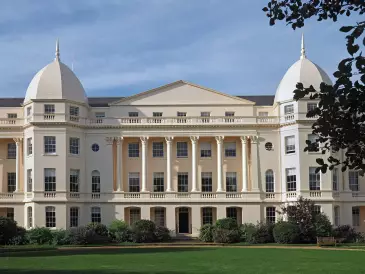Eduniversal Best Masters in Marketing in India
India's Master's in Marketing landscape for 2025 is evolving rapidly amid digital transformation, increased need for specialized skills, and dynamic education policies. This article explores market trends, program formats, curriculum focus, employability insights, access and affordability factors, and global competitiveness. Understand the key drivers shaping the marketing education ecosystem and how India positions itself globally.
Discover in detail the Master in Marketing in India
Context and Current Market Size in India's Master's in Marketing
While it's challenging to pinpoint the exact number of marketing master's students, India’s postgraduate sector continues to grow steadily, reaching nearly 8 million postgraduate students. A significant proportion of this population is enrolled in management and marketing-related degrees, thanks to digital marketing’s explosive rise. AlthoughContext and Current Market Size in India's Master's in Marketing
While it's challenging to pinpoint the exact number of marketing master's students, India’s postgraduate sector continues to grow steadily, reaching nearly 8 million postgraduate students. A significant proportion of this population is enrolled in management and marketing-related degrees, thanks to digital marketing’s explosive rise. Although dominated by domestic enrolments, international student numbers are showing a gradual upward trend, positioning India as an emerging education provider.
Several macroeconomic and digital trends fuel this growth:
- India’s digital advertising market exceeded USD 5.8 billion in 2024, with an impressive 11.9% YoY increase.
- Curriculum changes are reflecting regulations on digital ethics and privacy.
- Serious skill shortages in digital marketing, AI, content, and data analysis push universities to adapt.
- Internet and social media penetration drive need for digital-literate professionals (806M internet users and 491M social users).
- Growing attention is paid to sustainability and ethical marketing.
Other master's programs like Economics and General Management often overlap skills-wise with marketing, creating interdisciplinary synergies.
Marketing Program Demand & Curriculum Trends in India (2025)
Demand is increasingly segmenting into niche specializations:
- Digital and influencer marketing
- AI-led campaigns and customer analytics
- Neuromarketing and behavioral strategy
- Retail media and e-commerce
Universities are redesigning curricula to infuse interdisciplinary knowledge—mixing marketing with behavioral science and tech-driven tools. Micro-credentials and modular learning are now widely embedded, enabling flexible upskilling. Experiential elements through internships and capstones are becoming mandatory, with strong industry collaborations in cities like Mumbai or Bangalore.
Programs are also embracing technologies from data analytics to AR/VR and generative AI for content and customer engagement modeling.
Flexible Delivery Modes and Online Learning Expansion for India's Master's in Marketing
The pandemic has accelerated the shift toward flexible learning formats. Campus programs coexist with hybrid and fully online master's options. Stackable pathways dominate for professional learners, allowing them to build a degree over time.
This flexibility appeals to full-time professionals across India’s diverse regions and aligns well with working learners or career pivoters.
Popular university-industry tie-ups also contribute to curriculum modernization and delivery scalability, similar to domains like Innovation and Project Management.
Key Skills for Employability after India's Master's in Marketing (2025)
Employers now expect both hard and soft skillsets to be demonstrated. Desired technical competencies include:
- Google Analytics, SEO/SEM strategies
- Visualization tools like Power BI and Tableau
- Video content and social media campaign expertise
- Strategic use of AI-led marketing platforms
At the same time, transversal skills—creativity, adaptability, and communication—remain non-negotiable. Many also overlap with capabilities taught in Corporate Communication programs.
Placement prospects remain robust in IT, FMCG, startups, and digital-first firms. Master’s graduates typically earn between INR 6–15 lakh annually, depending on experience, location, and company size.
Quality Assurance and International Accreditation
Master’s in Marketing programs are overseen by bodies like the UGC and AICTE, with strong influence from the National Board of Accreditation (NBA). International collaborations bring added value, thanks to credit recognition frameworks and student mobility.
National strategies aim to retain top talent while nurturing global-ready professionals, often through partnerships in fields like Digital Law and New Tech.
Cost, Access & Affordability for India's Master's in Marketing
Tuition fees for a marketing master’s program range from INR 2 to 10 lakh per year, depending on institution type and program format. Uptake is highest in metros, although EdTechs help bridge rural access gaps.
Public scholarships, NGO aid, and corporate underwriting are increasingly supporting affordability. ROI is considered favorable, especially given the sector’s continued digital acceleration.
Cost dynamics remain a barrier for tier-2/3 city students. Hybrid and online options lift some financial burdens, but disparities remain evident across income and regional lines.
Global Competition and Strategic Future Outlook of India's Master's in Marketing
India faces competition from foreign universities attracting outbound students, but is counterbalancing that threat with EdTech-backed localized offerings. Dual-degrees and cross-border programs are making inroads too.
Emerging risks include lack of access to quality faculty, weak industry-academia bridges, and outdated infrastructure in rural or non-metro regions. There is also a need for faster alignment between fast-changing labor needs and what’s taught.
This mirrors challenges observed in disciplines like Big Data Management, where curriculum agility is key to staying competitive.
Outlook (2025–2028)
Baseline trends suggest continued growth as India matures digitally and increases policy-led skilling. Significant upside remains for programs centered on AI, analytics, immersive learning, and modular certifications. Government investments in international partnerships and digital education incubation will further raise India’s profile as a global marketing education leader.
In conclusion, the Master’s in Marketing ecosystem in India is poised for strong growth, given the strategic push toward digitization, curriculum modernization, and increasing career prospects. With the infusion of innovation in learning and a focus on employability, India can emerge as a regional and global hub for marketing talent.
Discover the Eduniversal Best Masters for Marketing
India
India
India
India
India
India
India
India
India
India
Latest news
Trinity Business School celebrates its 100th anniversary with a sustainable time capsule containing 155 messages from students and staff, designed to be opened in 2075 and connect future business leaders across generations.
London Business School's Corporate 100 Alliance unites global leaders to navigate AI disruption, sustainability, and economic change.
Explore how KEDGE Business School champions student-athletes through its innovative KEDGE Sport Community, blending academic success with athletic excellence.



